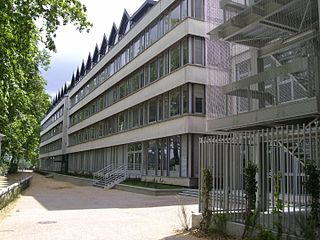An academic degree is a qualification awarded to a student upon successful completion of a course of study in higher education, usually at a college or university. These institutions often offer degrees at various levels, usually divided into undergraduate and postgraduate degrees. The most common undergraduate degree is the bachelor's degree, although some educational systems offer lower-level undergraduate degrees such as associate and foundation degrees. Common postgraduate degrees include engineer's degrees, master's degrees and doctorates.
An associate degree or associate's degree is an undergraduate degree awarded after a course of post-secondary study lasting two to three years. It is a level of academic qualification above a high school diploma and below a bachelor's degree.

Education in France is organized in a highly centralized manner, with many subdivisions. It is divided into the three stages of primary education, secondary education, and higher education. Two year olds do not start primary school, they start preschool. Then, by the age of six, a child in France starts primary school and soon moves onto higher and higher grade levels until they graduate.
An institute of technology is an institution of tertiary education that specializes in engineering, technology, applied science, and natural sciences.
A Diplom is an academic degree in the German-speaking countries Germany, Austria, and Switzerland and a similarly named degree in some other European countries including Albania, Bulgaria, Belarus, Bosnia and Herzegovina, Croatia, Estonia, Finland, Poland, Russia, and Ukraine and only for engineers in France, Greece, Hungary, North Macedonia, Romania, Serbia, Slovenia, and Brazil.

The University of Tours, formerly François Rabelais University of Tours, is a public university in Tours, France. Founded in 1969, the university was formerly named after the French writer François Rabelais. It is the largest university in the Centre-Val de Loire region. As of July 2015, it is a member of the regional university association Leonardo da Vinci consolidated University.

Le Mans University is a public university in western France with campuses in Le Mans and Laval.

University of Upper Alsace is a multidisciplinary teaching and research centre based in the two cities of Mulhouse and Colmar, France. Research and teaching at UHA concentrates mainly on science, technology, economics, management, arts and humanities. In 2017, UHA has more than 8000 students with about a hundred courses offered. The founding of UHA was driven by social and business players, among them was Jean-Baptiste Donnet.

Abdou Moumouni University, formerly the University of Niamey from 1974 to 1994, is a public university based in Niamey, the capital of Niger. The main campus is situated on the right bank of the Niger River. Historically, its students and faculty have been involved in protest movements in the capital.

A university technical institute or IUT is a type of post-secondary vocational college in France, similar to the yrkeshögskolan in Sweden.
The Diplôme d'études universitaires générales, abbreviated DEUG, was a French undergraduate degree that required two years of studies, roughly equivalent to an associate degree in the American educational system.
In France, the Répertoire national des certifications professionnelles (RNCP) has been created by article L. 335-6 of the Code de l'éducation.
The National Classification of Levels of Training is a system used in France for statistical purposes to measure an individual's training. Two classifications are commonly used: The nomenclature des niveaux de formation, established in 1969 by the Commission statistique nationale, and the International Standard Classification of Education (ISCED), validated by UNESCO in 1997 and used for international comparisons.
The Vélizy University Technical Institute is one of the French university technical institute.
The Brevet de technicien supérieur (BTS) senior technologist’s certificate is a national diploma of higher education in France, established in 1959.
L’École de design Nantes Atlantique is a private institution for technical education dedicated to the teaching of design. Founded in 1988, it has been managed by the Nantes-Saint Nazaire Chamber of Commerce and Industry since 1991. The school is recognized by the State and is one of the two schools in its field to award a design degree which is accredited by the French Ministry of Higher Education. This degree is also registered in the Registre National des Certifications Professionnelles as a Level I Master's degree.
The Mantes University Technical Institute is one of the French university technical institutes.
The Licence en droit is the French national diploma for undergraduate legal education. Universities in France award it after three years of study. The Licence allows its holders to give legal advice.
In France, a Titre, officially a Titre à Finalité Professionnelle, or by abuse of language, a Titre RNCP, is a state-recognized professional certification in the French education system, issued by a ministry or certifying institution, generally a private colleges (Écoles) or universities, after approval and registration in the National Professional Qualifications Register, or "RNCP" by the Vocational Certification Commission of France Compétences, the national regulatory authority for vocational training.
The maîtrise, or the one-year master's degree, is a French national diploma awarded by the French higher education system, created in 1966 and validating one year's study after the licence. It is a level 6 qualification in the National Professional Qualifications Register (RNCP) and is worth 60 ECTS credits.





